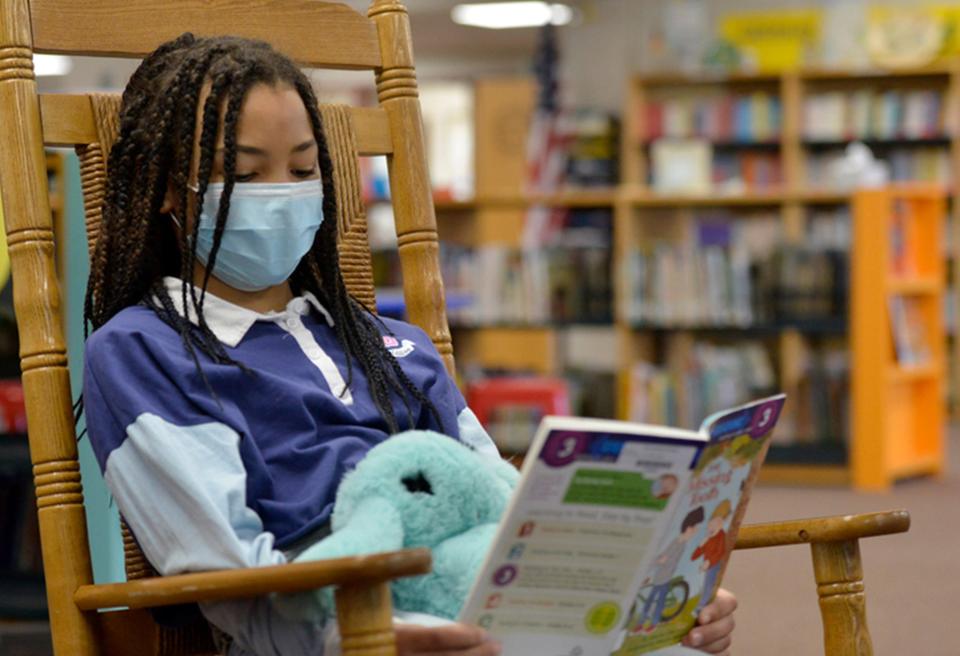Cyr seeks guarantee of school library book selection by educators at Statehouse hearing
- Oops!Something went wrong.Please try again later.
A new bill entitled “an act regarding free expression,” sponsored by state Sen. Julian Cyr, D-Truro, and state Rep. John Moran, D-Boston, has been introduced to forestall book bans in school libraries and public libraries.
Along with the legislators, advocates and educators testified Wednesday at a hearing on Beacon Hill in support of the legislative proposal.
The bill is intended to strengthen students’ free expression rights including the right to access library materials selected by school librarians and professional educators without external political or social interference, according to proponents.
The bill was introduced last year in the Senate as S.2528 and in the House as H.4229.
A non-partisan public policy organization dedicated to strengthening families in Massachusetts has said the bills intend to allow school librarians to keep "vulgar, sexually explicit books on the shelves of public school libraries."

What challenges to books have occurred
According to the American Library Association, the number of reported challenges to books in the United States doubled from 2021 to 2022.
“Forty-one percent of these bans challenged titles featuring LGBT+ themes and characters, 41% included a prominent character of color and 21% had contact on issues of racism,” Cyr said at the hearing.
Moran said that in 2022 alone Massachusetts saw 45 attempts to censor books and other library resources, on more than 30 books.
Decisions about book selection or removal should be based on educators’ professional training and not on personal beliefs and opinions, according to testimony Wednesday in support of the bill.
In December, police in Great Barrington searched a middle school classroom in response to an anonymous complaint about a book, prompting a letter from the ACLU and GLAD, according to an ACLU statement. Both organizations previously urged school districts to protect students’ legal rights by rejecting calls to remove library books.
Bill proposes to establish process to handle book challenges in schools
In addition, the bill aims to establish a process for considering whether any criticized book is "devoid of any educational, literary, artistic or social value or is not age appropriate for any children who attend the schools."
According to Cyr, the bill would prevent book removal due to personal or political views in school libraries; the bill would empower school librarians and teachers to determine access to age appropriate materials in schools; the bill requires public libraries to adopt the Constitution’s Bill of Rights and it protects librarians from retaliation.
“The bill requires that school library materials are selected based on a school librarian's professional training, and not on political, or personal views,” said Cyr.
“To overturn a school librarian's decision, the bill requires a clear, public process by the School Committee. And if the School Committee decides to overturn the librarian's decision, the material must be found to be devoid of educational literary, artistic or social value or not be age appropriate for any student in the school,” he said.
'Pornographic Schoolbook Bills'
State Rep. Kelly W. Pease, R-Westfield, raised questions about a specific book having content that he believed might not be age appropriate for some students.
Massachusetts Family Institute issued a public letter calling for action against the bill, ahead of the Wednesday session.
“Legislators want to make it nearly impossible to remove pornographic material from K-12 public school libraries and give activist school librarians more power," Mary Ellen Siegler, the institute's director of communications, research, and operations, said in the letter.
Proponents filed the bill because they want to allow school librarians to keep "vulgar, sexually explicit books on the shelves of public school libraries, where minor students can access them," Siegler wrote. That’s why the institute dubbed the bills the "Pornographic Schoolbook Bills,” she wrote.
“I would wager that if we could go through multiple books that are on the shelves in schools across Massachusetts, we would find that certain books contain pornographic or subjective content, but in a heterosexual perspective, and those just haven't been looked at or talked about,” said Cyr in response.
Who is making decisions about the books?
"Under the guise of preventing 'book banning,' radical legislators want to stop local school committees from protecting children from age-inappropriate content at school,” Massachusetts Family Institute wrote in the letter.
Moran said, though, the bill doesn't prevent parents from censoring certain books for their children, but rather restricts organizations to censor these based on their political beliefs.
“No one can have the right in the state of Massachusetts to prohibit an entire population from reading these books, that's ridiculous,” said Moran.
Among those testifying were representatives of ACLU Massachusetts, Jewish Alliance for Law and Social Action, Massachusetts Library Association, Massachusetts School Library Association and MassEquality.
Thanks to our subscribers, who help make this coverage possible. If you are not a subscriber, please consider supporting quality local journalism with a Cape Cod Times subscription. Here are our subscription plans.
This article originally appeared on Cape Cod Times: In school library book challenge, Cyr bill seeks politics-free review

